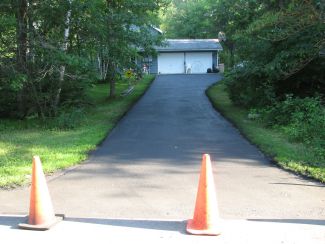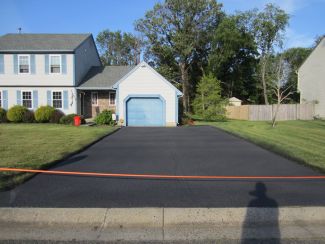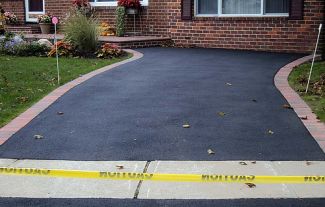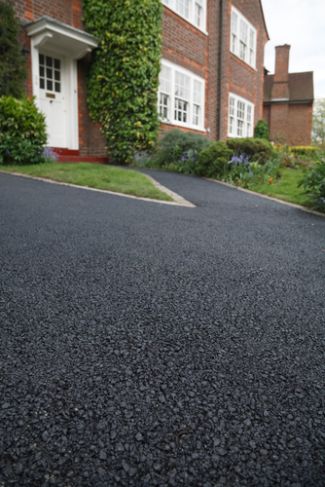Driveway Sealing Tips

We all spend a good amount of time and energy maintaining our houses and yards. Amid all the household repair tasks, one item that is easy to overlook is the driveway. However, a good looking, well maintained driveway adds a lot of curb appeal to your home, while a neglected driveway can be an obvious eyesore. Fortunately it is reasonably easy to keep your driveway in good condition by repairing cracks and sealing it periodically. Read on for some helpful driveway sealing tips.
First, a few words on some common causes of driveway cracks…
The initial paving job is actually often responsible for cracks that develop later. The paving may have taken place on a cold day, causing the asphalt to not set properly, for example. Also, the area under the driveway may have not been packed down sufficiently before the paving took place, allowing some areas below the driveway to shift or settle later. In the case of re-paving, the surface of the old driveway may have not been cleaned well enough before the new asphalt was laid down, preventing the new surface from bonding properly.
 Aside from the original paving job, weather and temperature also cause cracks. In areas with cold winters, the continual freezing and thawing, combined with moisture that has seeped into the driveway surface can cause asphalt to expand and contract, eventually resulting in cracks. Additionally, asphalt can be damaged from contact with oil, gasoline, or ice-melting compounds.
Aside from the original paving job, weather and temperature also cause cracks. In areas with cold winters, the continual freezing and thawing, combined with moisture that has seeped into the driveway surface can cause asphalt to expand and contract, eventually resulting in cracks. Additionally, asphalt can be damaged from contact with oil, gasoline, or ice-melting compounds.
Driveway Sealing Tips
You should seal your asphalt driveway regularly, every 2 to 4 years. One way to gauge whether your driveway is in need of a fresh coat of sealant, is to pour water onto the driveway and watch to see if it forms into beads on the surface or seeps into the asphalt. If it does make its way into the asphalt, then you should go ahead and seal the driveway.
 Here are some basic driveway sealing steps to follow. Since every situation is different, consult a driveway or asphalt professional for specific advice for your particular driveway, and be sure to follow the instructions of the driveway sealant products that you buy. Also, follow common sense safety measures, such as wearing gloves, avoiding skin contact with the sealant, and keeping from breathing in the smell of the sealant, as well as any safety precautions listed on the driveway products you buy.
Here are some basic driveway sealing steps to follow. Since every situation is different, consult a driveway or asphalt professional for specific advice for your particular driveway, and be sure to follow the instructions of the driveway sealant products that you buy. Also, follow common sense safety measures, such as wearing gloves, avoiding skin contact with the sealant, and keeping from breathing in the smell of the sealant, as well as any safety precautions listed on the driveway products you buy.
- First, clean the driveway thoroughly. This is imperative, since the sealer needs to be able to adhere to a clean surface. Ideally, pressure wash your driveway to clean it completely. If you do not own a pressure washer, they are easy to rent from an equipment rental company. Also, completely remove all weeds (including roots), debris, dirt, and other loose items from the cracks in the driveway. Use weed killer if necessary to ensure that weeds are completely gone from the cracks.
-
 Fill any small, narrow driveway cracks with asphalt patching compound. Press the compound into the crack with a trowel, and smooth its surface. Wider cracks, where the ground below the driveway is visible, present a larger challenge since they could prevent the driveway sealer from working properly. For these wide cracks, fill the crack partially with sand, before filling the remaining space with crack sealer. Repairing cracks immediately as you notice them, while they are still small, is one of the most beneficial things you can do for your driveway.
Fill any small, narrow driveway cracks with asphalt patching compound. Press the compound into the crack with a trowel, and smooth its surface. Wider cracks, where the ground below the driveway is visible, present a larger challenge since they could prevent the driveway sealer from working properly. For these wide cracks, fill the crack partially with sand, before filling the remaining space with crack sealer. Repairing cracks immediately as you notice them, while they are still small, is one of the most beneficial things you can do for your driveway. - Apply asphalt sealer to the driveway, in a side-to-side motion, instead of applying it up and down (the long way). Be sure to do this on a reasonably hot day, with low humidity, so that the sealer sets properly. Of course, keep off the driveway while the sealer is drying. Products vary, but they often require around 24 hours to set.
Although you may not feel like spending a summer day laboring over hot pavement, sealing your driveway really is not that arduous of a process, for most driveways. If you regularly maintain your driveway, not only will you keep it in good condition, but you will also be rewarded with a smooth, clean looking driveway, which adds a surprising amount of visual appeal to your property.
Image sources conjake6, rdowens, and positionmktg
 The Driveway Sealing Tips by Water Damage Defense, is licensed under a Creative Commons Attribution-ShareAlike 3.0 Unported License.
The Driveway Sealing Tips by Water Damage Defense, is licensed under a Creative Commons Attribution-ShareAlike 3.0 Unported License.

 Fill any small, narrow driveway cracks with asphalt patching compound. Press the compound into the crack with a trowel, and smooth its surface. Wider cracks, where the ground below the driveway is visible, present a larger challenge since they could prevent the driveway sealer from working properly. For these wide cracks, fill the crack partially with sand, before filling the remaining space with crack sealer. Repairing cracks immediately as you notice them, while they are still small, is one of the most beneficial things you can do for your driveway.
Fill any small, narrow driveway cracks with asphalt patching compound. Press the compound into the crack with a trowel, and smooth its surface. Wider cracks, where the ground below the driveway is visible, present a larger challenge since they could prevent the driveway sealer from working properly. For these wide cracks, fill the crack partially with sand, before filling the remaining space with crack sealer. Repairing cracks immediately as you notice them, while they are still small, is one of the most beneficial things you can do for your driveway.